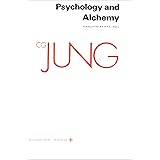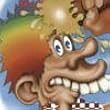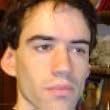
Enjoy fast, free delivery, exclusive deals, and award-winning movies & TV shows with Prime
Try Prime
and start saving today with fast, free delivery
Amazon Prime includes:
Fast, FREE Delivery is available to Prime members. To join, select "Try Amazon Prime and start saving today with Fast, FREE Delivery" below the Add to Cart button.
Amazon Prime members enjoy:- Cardmembers earn 5% Back at Amazon.com with a Prime Credit Card.
- Unlimited Free Two-Day Delivery
- Streaming of thousands of movies and TV shows with limited ads on Prime Video.
- A Kindle book to borrow for free each month - with no due dates
- Listen to over 2 million songs and hundreds of playlists
- Unlimited photo storage with anywhere access
Important: Your credit card will NOT be charged when you start your free trial or if you cancel during the trial period. If you're happy with Amazon Prime, do nothing. At the end of the free trial, your membership will automatically upgrade to a monthly membership.
Buy new:
-36% $22.49$22.49
Ships from: Amazon.com Sold by: Amazon.com
Save with Used - Acceptable
$12.94$12.94
Ships from: Amazon Sold by: 2nd Life Aloha

Download the free Kindle app and start reading Kindle books instantly on your smartphone, tablet, or computer - no Kindle device required.
Read instantly on your browser with Kindle for Web.
Using your mobile phone camera - scan the code below and download the Kindle app.

OK
The Collected Works of C. G. Jung, Vol. 7: Two Essays on Analytical Psychology Paperback – April 1, 1972
Purchase options and add-ons
This volume has become known as perhaps the best introduction to Jung's work. In these famous essays. "The Relations between the Ego and the Unconscious" and "On the Psychology of the Unconscious," he presented the essential core of his system. Historically, they mark the end of Jung's intimate association with Freud and sum up his attempt to integrate the psychological schools of Freud and Adler into a comprehensive framework.
This is the first paperback publication of this key work in its revised and augmented second edition of 1966. The earliest versions of the Two Essays, "New Paths in Psychology" (1912) and "The Structure of the Unconscious" (1916), discovered among Jung's posthumous papers, are published in an appendix, to show the development of Jung's thought in later versions. As an aid to study, the index has been comprehensively expanded.
- Print length369 pages
- LanguageEnglish
- PublisherPrinceton University Press
- Publication dateApril 1, 1972
- Dimensions6.02 x 0.92 x 8.98 inches
- ISBN-100691017824
- ISBN-13978-0691017822
The Amazon Book Review
Book recommendations, author interviews, editors' picks, and more. Read it now
Frequently bought together

Similar items that may ship from close to you
Editorial Reviews
Review
"[This work] is important as evidence of the evolution of Jung's thought (the book contains the original essays which were written in 1912 and 1916 as well as their most recent revisions) and is valuable as an introduction to the 'analytical' or 'complex' psychology of the Jungian school."---Thomas J. J. Altizer, The Journal of Religion
From the Back Cover
Product details
- Publisher : Princeton University Press; 2nd ed. edition (April 1, 1972)
- Language : English
- Paperback : 369 pages
- ISBN-10 : 0691017824
- ISBN-13 : 978-0691017822
- Item Weight : 1.18 pounds
- Dimensions : 6.02 x 0.92 x 8.98 inches
- Best Sellers Rank: #219,547 in Books (See Top 100 in Books)
- #195 in Medical Psychoanalysis
- #281 in Popular Psychology Psychoanalysis
- #636 in Cognitive Psychology (Books)
- Customer Reviews:
About the author

Carl Gustav Jung (1875-1961) was a Swiss psychiatrist, an influential thinker and the founder of analytical psychology (also known as Jungian psychology). Jung's radical approach to psychology has been influential in the field of depth psychology and in counter-cultural movements across the globe. Jung is considered as the first modern psychologist to state that the human psyche is "by nature religious" and to explore it in depth. His many major works include "Analytic Psychology: Its Theory and Practice," "Man and His Symbols," "Memories, Dreams, Reflections," "The Collected Works of Carl G. Jung," and "The Red Book."
Customer reviews
Customer Reviews, including Product Star Ratings help customers to learn more about the product and decide whether it is the right product for them.
To calculate the overall star rating and percentage breakdown by star, we don’t use a simple average. Instead, our system considers things like how recent a review is and if the reviewer bought the item on Amazon. It also analyzed reviews to verify trustworthiness.
Learn more how customers reviews work on AmazonReviews with images
-
Top reviews
Top reviews from the United States
There was a problem filtering reviews right now. Please try again later.
So much valuable information contained here, and so much to think through and practice. More importantly, the book seems to be a great introduction to Jung. It really contains a lot of his ideas, or so I think since I haven't read much of Jung yet.
All I can say is that this book has left me both satisfied and wanting more. I will definitely be reading it again.
In the second essay, devoted to individuation and unconscious development, I can see the effect of patients upon the therapist by the end of the chapter, but some of the material strikes me as original, for example, the concept that the imago and collective unconscious could be overcome by exceptional individuals. This is not easy to fathom for those that may be prone to madness like myself, leaving a kind of uncontended wall between the therapist and the patient, something that has been one of the traditional roadblocks to genuine transformation. One suspects that the only difference between the mad and the sane is a god-given gift, something this book does not entirely dis-spell.
All in all, good psychology, but lacking in miracles. Maybe the reverse of what a psychologist would find.
Top reviews from other countries
He practiced at the Psychiatric Clinic in Zurich(p 21) where the association method was developed where the ideas of personal conflicts as they develop or degenerate in multi layered complexes often resulting in regressive illnesses and obscuring the development of personal identity? I recently penned a novel Rhythm and Weep(the title from a three stooges short on female suicides in the U.S.)where I made use of this psychiatric model of understanding modern persons? He calls this phenomenal view "the interior of the house"(21). He has a different way from FReud in terms of understanding "interior worlds" as he will elaborate and fantasies of lust, sex, violence and incest. He then undertakes Adlers POwer psychology in terms of a person "tyrannizing over the entire household"(39)..he finds such power psychologies, a key part of modern persons, even though hemay find the traits undesirable and destructive? An interesting way to look at persons rather than in contemporary culture, in terms of the polarity of gay/straight,
sexualizing personalities, he opens up the fertile ground of extroversion/introversion and even though this is an old volume I think even contemporary analysts would profit to look at it? There is talk of the reflective personality and is this a facet of cultural integration, spirituality or acceptance and infusion of the local environment and its norms? He believes in the abstract idea of love? Not all therapists do, if you do you should search for one who sympathizes with your own emotional development. For the analyst love wants to deconstruct what he sees as primitive lusts for power, vacate it from the psyche and open up a world..of introversion, maybe? To understand the theorist analyst is to approach problems and people from the world of polarities and see how the individual adapts, finds values, makes choices and develops?
On p 71 the "puffed up attitude" may seem narcissistic and you can compare with the later analyst KOhut in the self aggrandizing personality, the "grandiose self." A more recent writer whom I think is worthy of study? He distinguishes his diagnoses as different from causal/reductive or theories drawn from deterministic science, as in classical psychoanalysis and psychiatry and an open ended search for the person. He finds each person unique from the label attached to him..the label are symptoms a person may display in his own fashion. He later goes on to discuss those capable of undergoing the "transcendent function"(p 99) and later talks of the idea of God or perfection..think of the philosophy of Descartes..as it relates to the development of the personality and those able to form morals, and spirituality and the contemplative psyche? Those able to develop and maintain spiritual or religious states(he doesnt go into this in this volume) can be those freed from regressive maladies?
Ancient psychology and philosophy dealt with individuation? He wants to study it, bring it from the world of philosophy into a diffeerent stream of thought the world of psychological science and psychotherapy? He is and remains always a clinician..his patients need to be helped. He is a helper..he never wants to save a person, and finds such clinicians dangerous for their clients, since they need to seek out help themselves(the object of help)
by making choices in their environment, and cutting things out from their world as a child cutting designs on a printed page? Here is the world or imagery of demons, not bein gunder the influence of.."the dark interior world"(p 174) he finds difficult to comprehend? He finds two books one by william James on Religion and the other Christina Alberta's Father(based on his own ideas of psychology)..and here the author finds in Christina Alberta..the novel of a liberated women in the authors eyes..and her father "mr Preemby" a "nonentity" a person who finds life meaningless
and develops an altar ego..to save the world..and is placed in a lunatic asylum and dies(perhaps a parable on the authors own understanding of himself)? Here also we have the idea of MESSIANIC personalities..as they relate to persons politics and religion? Also the world of contemporary politics?
The author is well versed in philosophy science psychology religion and so many topics? AS versatile as the medieval scholar and some may find this who look for a more simplified approach off putting? His approach is the proper way to help clients, and in his individuation psychology finding love and loving themselves, building self esteem and not a bloated narcissistic type "inflated" self, and trying to find love(if you choose) or whatever or wherever your self concept or identity lies in the world around you..he has his own biases? H e knows his biases and he wants to know whether his clients know,,themselves..for those able to reach the higher stages of the brain, the latest developments of the physical brain..the areas of contemplation(if my remembrance of brain physiology or phrenology is correct?). I will end in the area of Leibnitz's monads(monad as oneness) as compared to the world of plurality..polytheism..paganism and its common fprm in the contemporary psyche? He find in many ways the pagan mind finds so much in the world the monotheist..or those unifying findin goneness dont..think of the world of all those helping angels..or the household Gods in catholic or taoist world..the Kitchen Gods Wife..another novel. This world is different from the simple world of the modern scientific view..so he develops(and he has the advantage of being also a SCIENTIFIC PHILOSOPHER)..determinism/indertiminism..the introverted(thinking)extroverted(feeling)..as he puts it and where do you find yourself..the next volume in this collection deals with causality..duration..change..going from point a to b to g..and all will find it a great challenge..and we will end in his own words "the individual is by definition something unique that cannot be compared with anything else..separate the concept of the individual" the persona from being "dissolve din the collective." This too is the bias of the author?
Easy to read, fine balance between examples, illusions and theories. Great basic view on the balance between the conscious and the unconscious worlds in our heads.
Pinpoint explanation on neurosises and maintaining the world of illusion.
Alas only a few will understand what he is talking about. Not because the majority cannot comprehend but because the theorie goes beyond cause & effect and enters the reader in the realm of quantum mechanics. Inspirational for readers of Deepak Chopra, Paul McKenna, Eckhart Tolle, Wayne Dyer, etc, etc due to the very basics of illusionary living.














